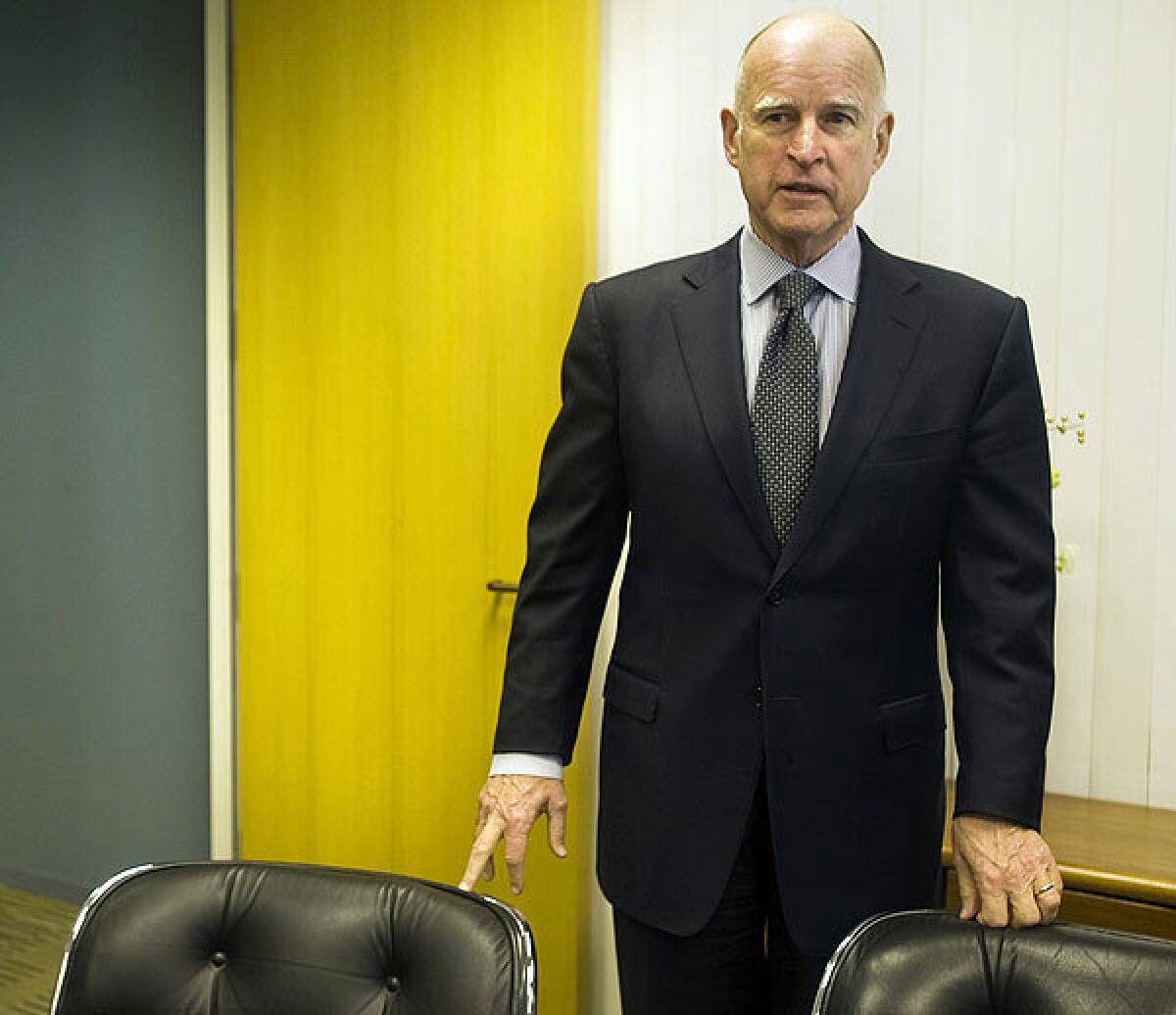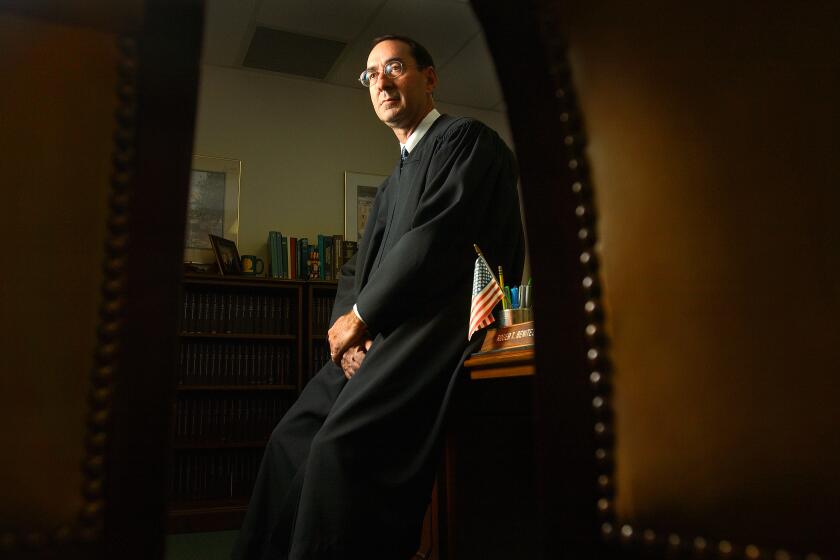Brown takes tougher tack on wealthy

Months ago, Gov. Jerry Brown won business and labor backing for an initiative that combined higher taxes on California’s top income earners with a half-cent sales tax — a strategy he said would share the pain of addressing the state’s budget woes.
But on Wednesday, bowing to pressure from liberal activists, the governor modified his proposal, agreeing to cut the sales tax hike in half and place a greater share of the burden on the wealthy.
Brown cast the revision as a strategic move to reduce the number of tax proposals voters may face on the November ballot — and increase the chances that the electorate will embrace at least one measure to provide a sorely needed revenue increase.
“This united effort makes victory more likely and will go a long way toward balancing our budget and protecting our schools, universities and public safety,” Brown said in a statement.
The deal takes off the table a proposal, sponsored by the California Federation of Teachers, that had sought a special millionaires tax. It immediately drew criticism from political observers, who said Brown was tarnishing his carefully cultivated image of an honest broker who would not be moved by political pressure.
“It’s a strong display of the governor’s weakness,” said Rob Stutzman, a GOP operative. “He gets his knees buckled by a backwater union. It’s not even one of the powerhouses.”
According to Brown’s allies, the changes are fairly modest and the structure of the plan remains the governor’s.
Brown had originally proposed raising income tax rates on those making at least $250,000 while increasing the state sales tax, which hits all consumers, by half a cent. Under the revised plan, sales taxes would go up by a quarter-cent and wage earners making more than $300,000 would have to dig even deeper into their pockets.
That formula would raise up to $2 billion more next year than under Brown’s initial proposal. But revenues eventually would flatten out to the level of the earlier initiative, $5 billion to $7 billion annually, according to early analysis by Democratic aides.
“The governor’s original measure was more difficult to pass,” said Rick Jacobs, chairman of the Courage Campaign, a liberal group that had joined with the teachers federation in backing a millionaire’s tax. “This one will be easier because we’re all in it together and it’s more progressive.”
After a news conference at a Boeing facility in Long Beach to celebrate the new 787 Dreamliner, Brown was asked why it took him so long to reach a compromise.
“The life of politics is something that changes and evolves,” the governor said. “I have no ego in this.”
The 11th-hour nature of the deal brings with it a number of complications.
Brown has about six weeks to get the new measure on the ballot. That involves having the attorney general’s office issue some necessary paperwork, receiving an evaluation of the plan from state finance officials and getting clearance from the secretary of state’s office to gather the more than 1 million signatures needed — an expensive proposition.
As a safeguard, Brown’s aides said, he would continue to gather signatures for his original measure. That led skeptics on Wednesday to predict that the governor could still decide to place his first proposal on the ballot, despite the deal.
State Senate President Pro Tem Darrell Steinberg (D-Sacramento) dismissed that possibility. The tighter timeline, Steinberg said, is “doable. It’s going to take a lot of work and it’s going to take money.”
Veteran signature-gatherers, however, questioned whether Brown could meet the deadline.
“If you called me up and said you were a private citizen and said, ‘I want to start today and get on the November ballot,’ I would say, ‘You’re five months late,’ ” said Chip Nielsen, an initiative specialist. “This is different because this is the governor, and the governor is saying the state is going off the cliff if we don’t ask for a tax increase.”
The compromise does not address a third tax initiative, championed by civil rights attorney Molly Munger, that is seeking an across-the-board income tax hike to provide $11 billion for public schools. Munger has rebuffed Brown’s calls to back down from the effort.
On Wednesday, Munger’s camp issued a statement that said Brown’s compromise effort did not alter its plans. “We have an open line of communication with the governor’s office, and we look forward to continuing the dialogue … in a productive way as we move forward,” campaign manager Addissu Demissie said.
The compromise did cheer many Democrats in Sacramento who have been concerned by infighting among the three factions pushing for tax increases.
“This responsible agreement will ask less of those who were hit hardest in the recession, while ensuring that those who have profited the most contribute a larger share,” said Assembly Speaker John A. Pérez (D-Los Angeles).
But word of the deal leaked out before Brown could inform his allies in the business community, and it was unclear whether they would support the new proposal.
In recent days, two of the state’s most powerful business groups — the California Chamber of Commerce and the Business Roundtable — issued statements vowing to oppose Munger’s tax and the millionaire’s tax. Both were neutral on Brown’s measure.
Neither group took a public stance Wednesday on the compromise announcement. But Republicans were quick to pounce.
“The closed-door deal he cut today is little more than putting lipstick on a pig,” Assemblywoman Connie Conway (R-Tulare) said of Brown in a statement. “Public opinion polls have already shown that the more voters know about the governor’s tax hikes, the less they like them. I believe voters will see through this new sham of a proposal.”
Michael J. Mishak and Nicholas Riccardi in Sacramento and W.J. Hennigan in Long Beach contributed to this report.
More to Read
Start your day right
Sign up for Essential California for news, features and recommendations from the L.A. Times and beyond in your inbox six days a week.
You may occasionally receive promotional content from the Los Angeles Times.






